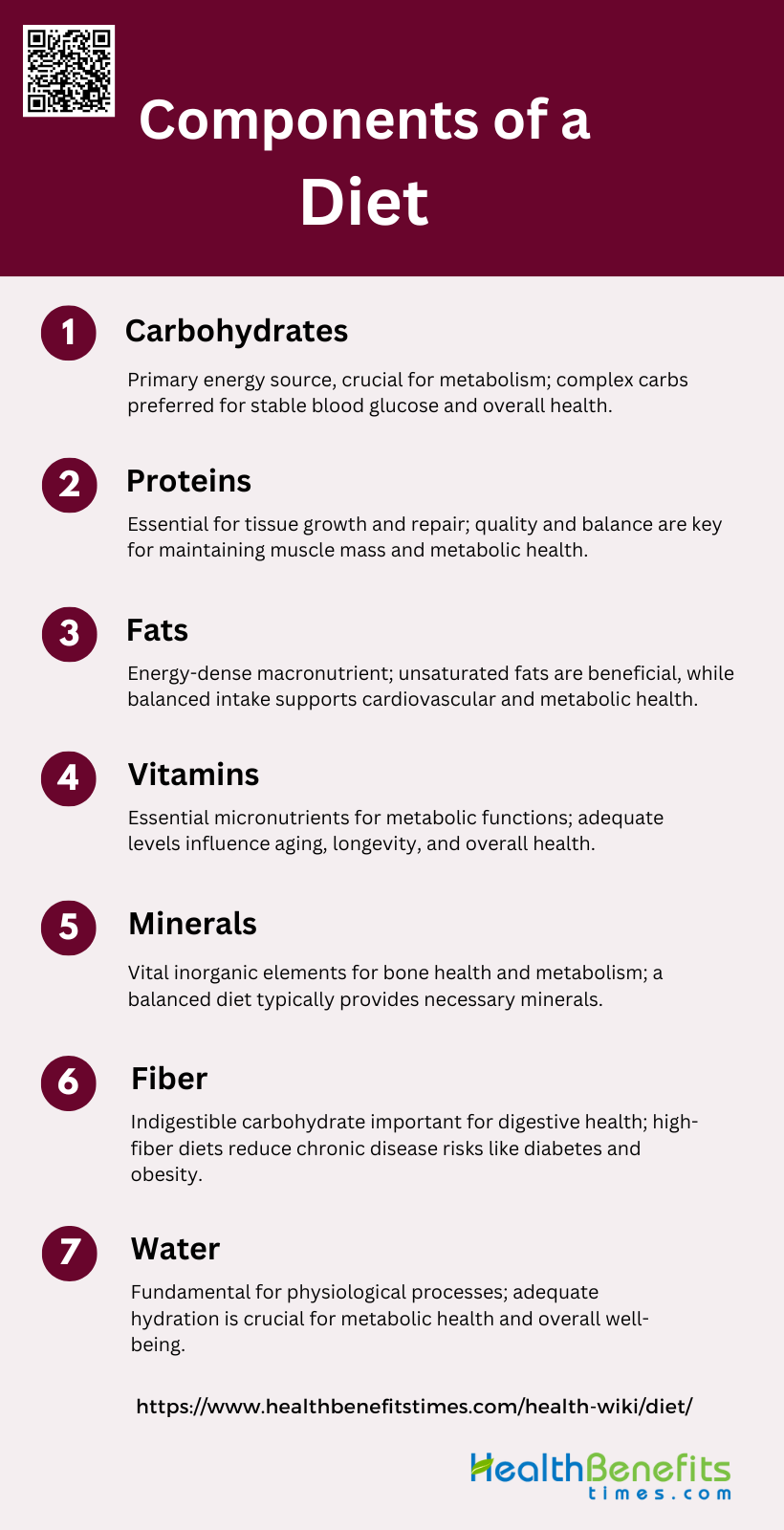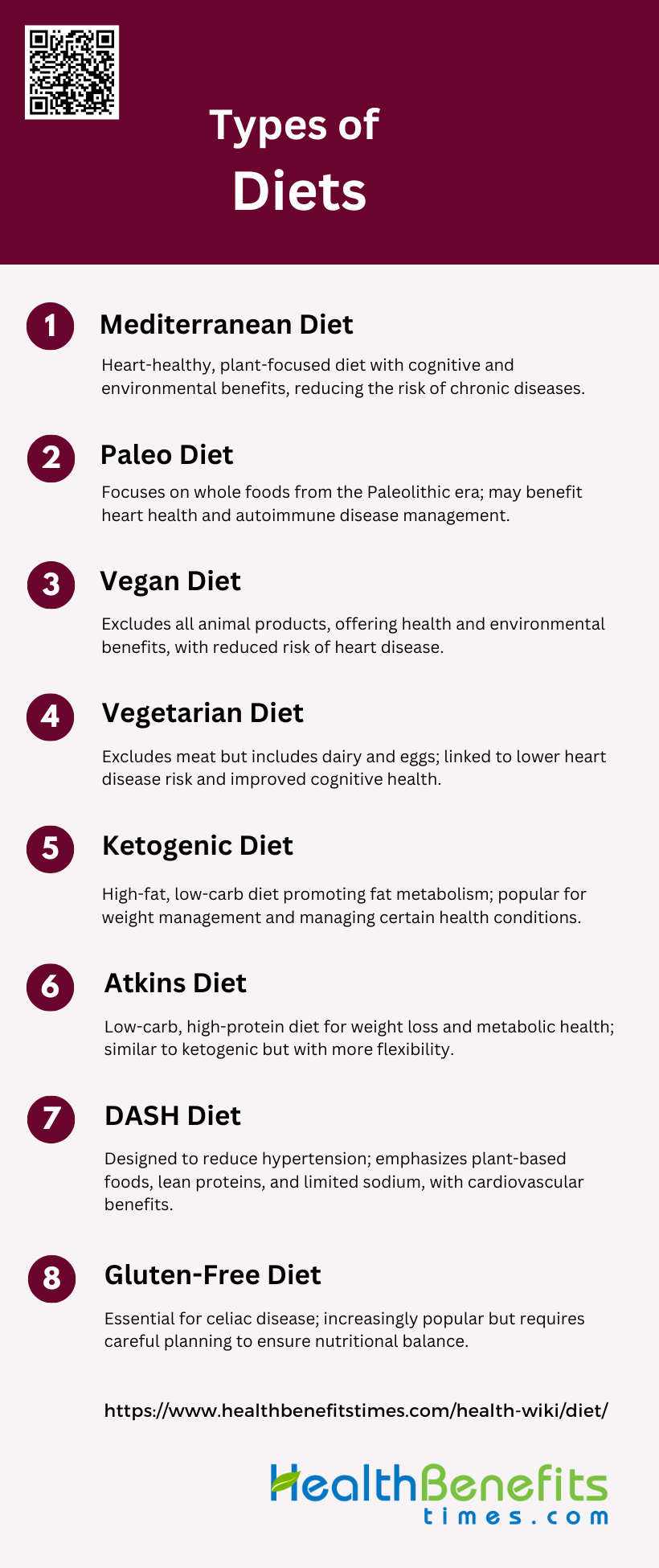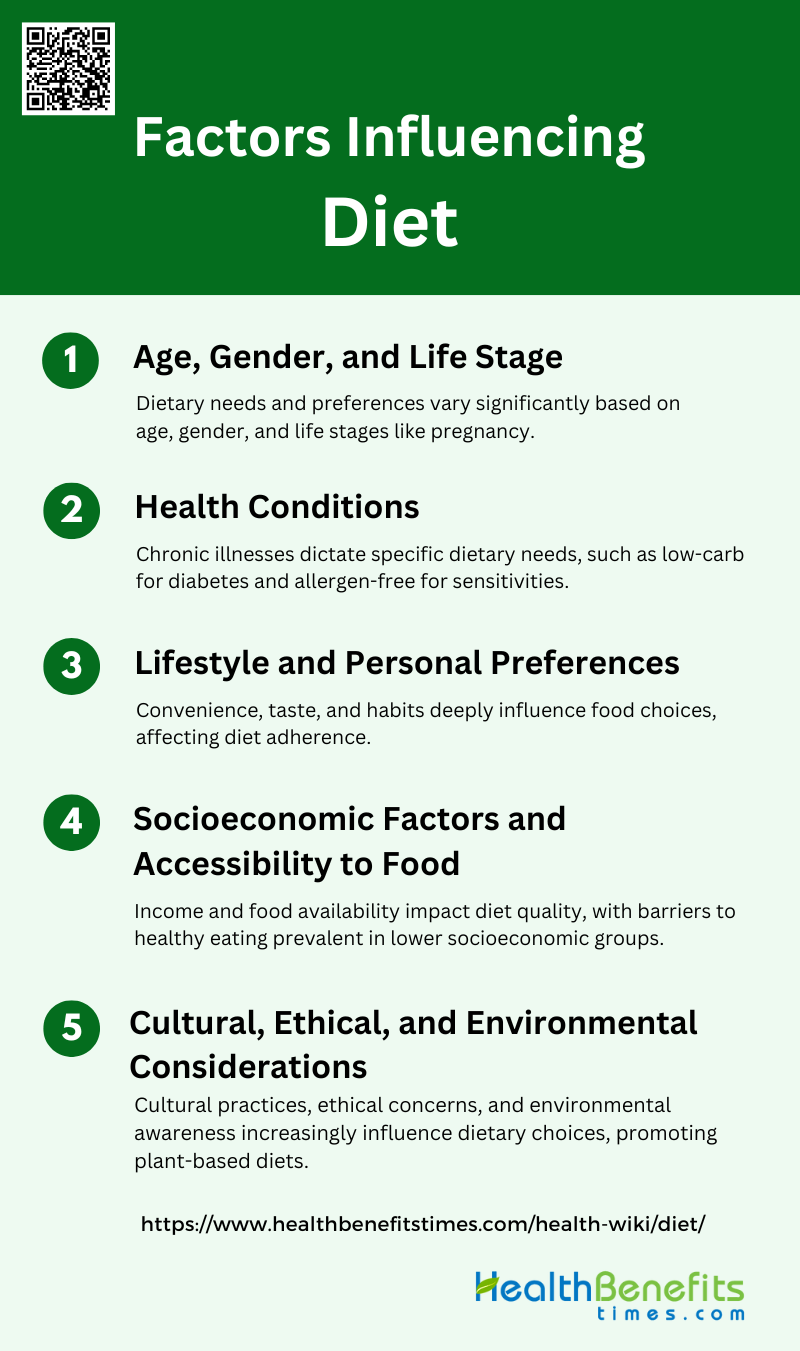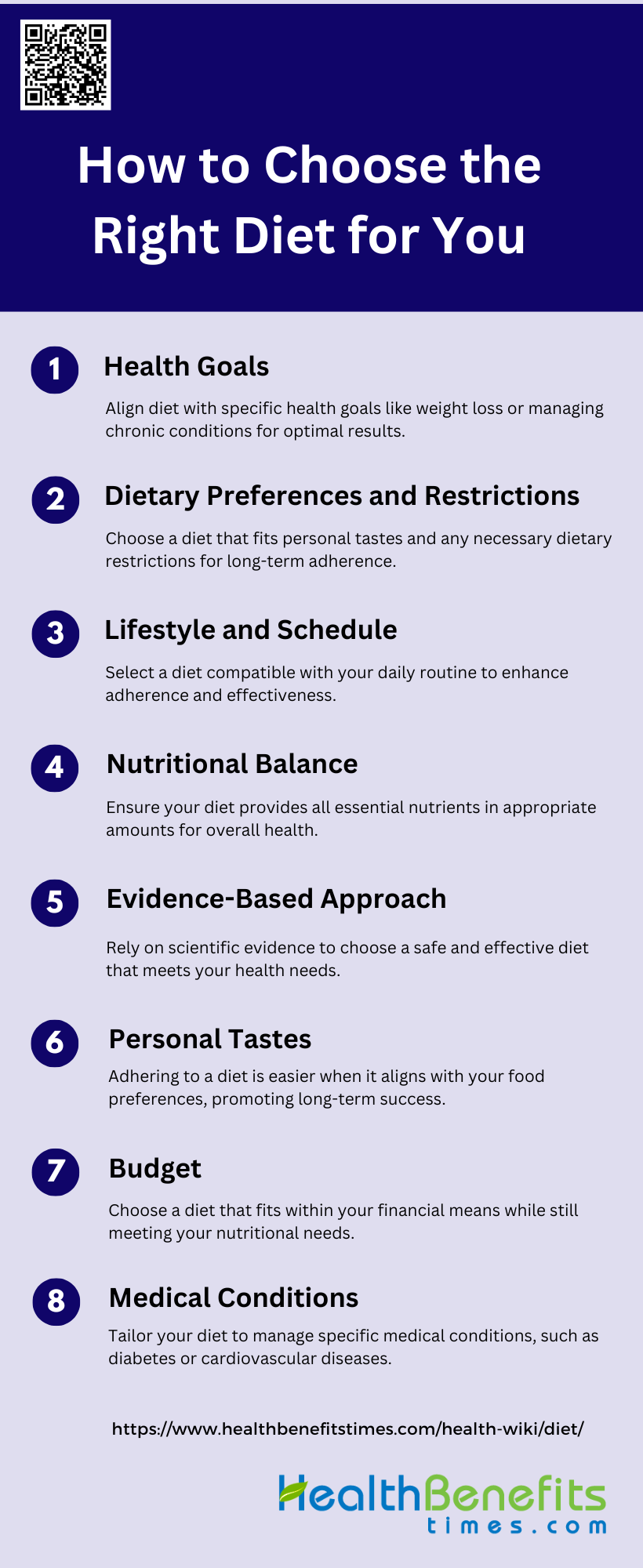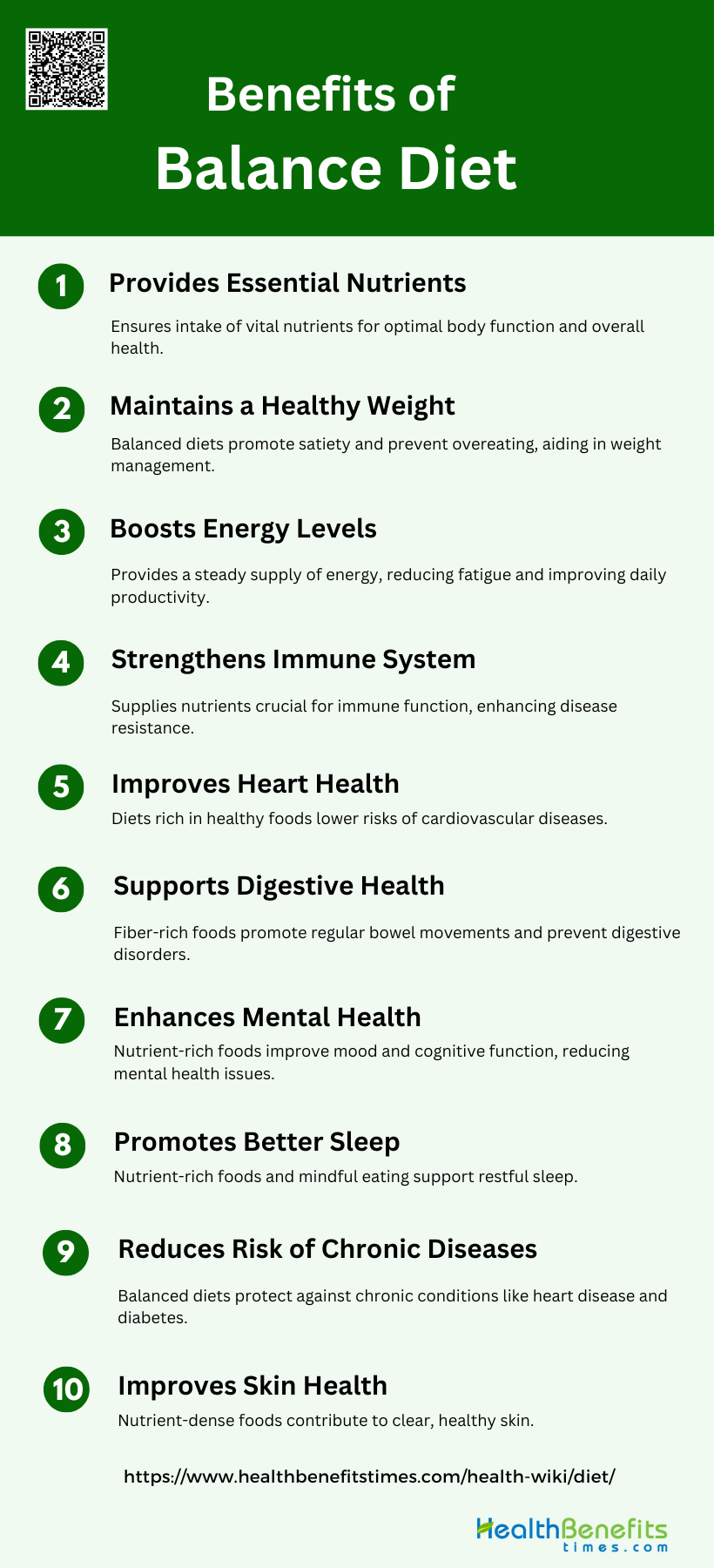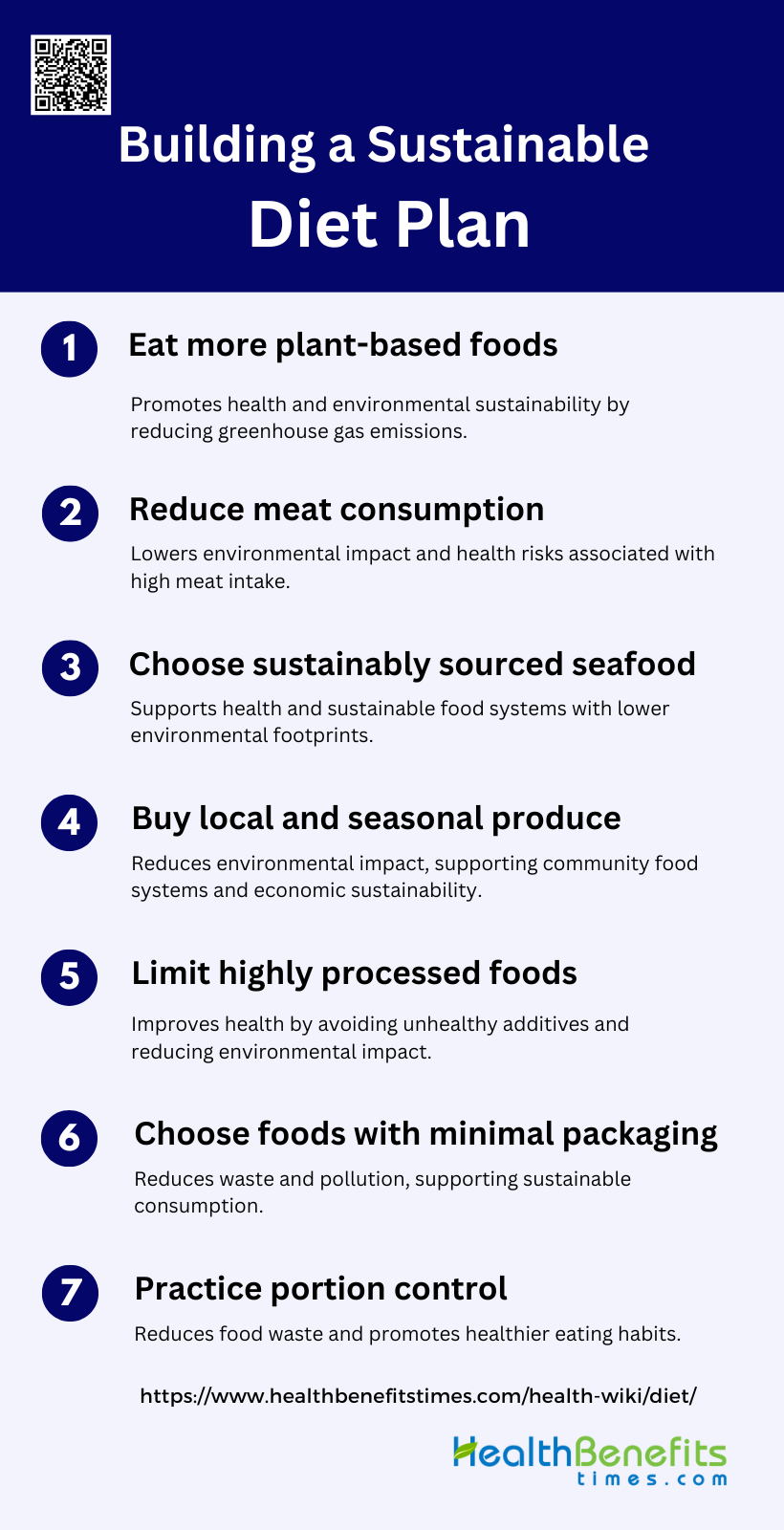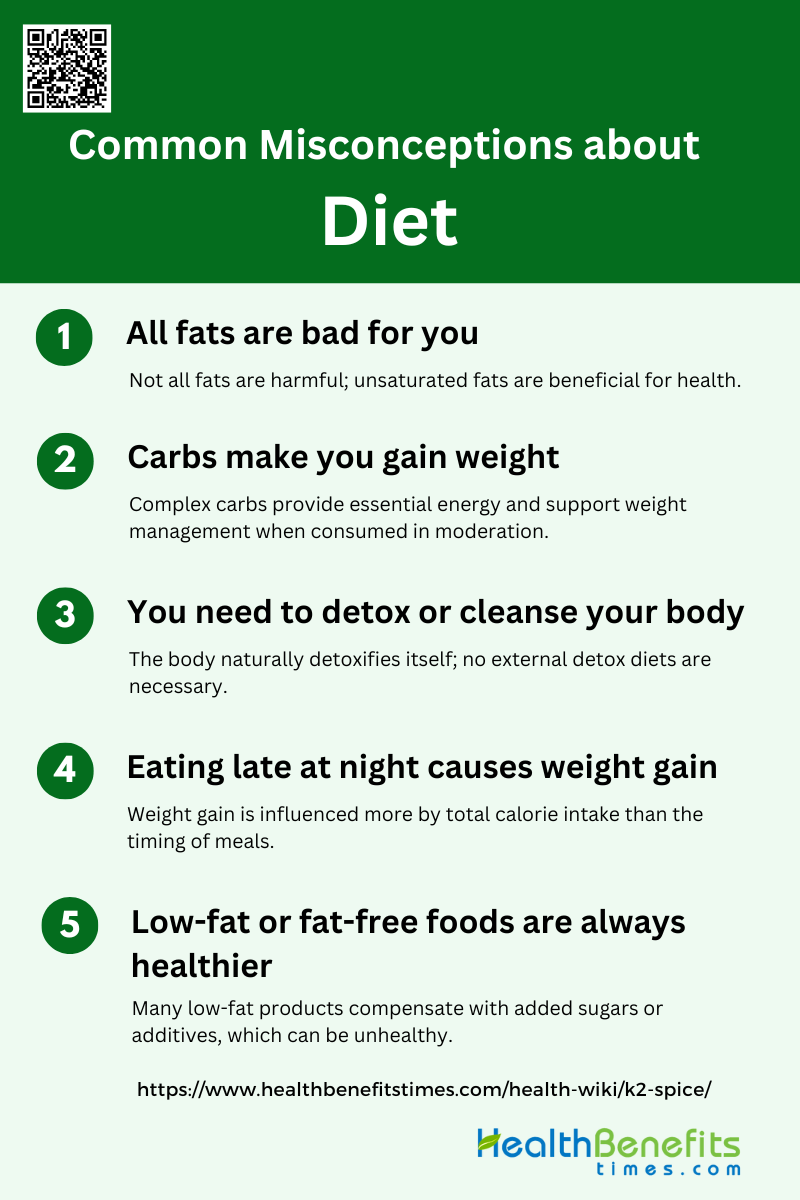Diet refers to the sum of food and drink that a person or animal habitually consumes. It encompasses not only the types of food eaten but also the quantities and proportions of different nutrients ingested. A person’s diet can be influenced by various factors, including cultural traditions, personal preferences, socioeconomic status, and health considerations. Diets can vary widely across different regions and populations, ranging from traditional patterns like the Mediterranean diet to more modern “globalized” diets characterized by highly processed foods. The composition of one’s diet plays a crucial role in overall health and well-being, with certain dietary patterns being associated with reduced risks of chronic diseases such as cardiovascular disease, diabetes, and certain cancers. As such, understanding and defining different dietary patterns is an important area of research in nutrition and public health.
Components of a Diet
A balanced diet is essential for maintaining good health and well-being. It comprises various components that provide the necessary nutrients for the body to function optimally. Below are the key components of a diet:
1. Carbohydrates
Carbohydrates are a primary source of energy for the body, playing a crucial role in maintaining metabolic processes and overall health. They are categorized into simple and complex carbohydrates, with the latter being more beneficial due to their slower digestion and sustained energy release. Diets high in carbohydrates, especially complex ones, have been shown to be nutritionally adequate and beneficial for individuals with conditions like diabetes, as they help in maintaining stable blood glucose levels. However, the balance of carbohydrate intake is essential to avoid rapid fluctuations in blood sugar, which can lead to chronic diseases such as obesity and type 2 diabetes.
2. Proteins
Proteins are essential macronutrients that serve multiple functions in the body, including tissue growth, repair, and cell signaling. They are also a source of energy, providing the same caloric value per gram as carbohydrates. The balance of protein intake is crucial for maintaining muscle mass and overall health. Studies have shown that diets with varying protein content (15% to 25%) can result in similar weight loss outcomes, indicating that protein’s role in diet is more about quality and balance rather than quantity alone. Proteins are vital for metabolic health and are particularly important in managing conditions like diabetes and obesity.
3. Fats
Fats are the most energy-dense macronutrient and are essential for various bodily functions, including hormone production and nutrient absorption. There are different types of fats, with unsaturated fats being more beneficial for health compared to saturated fats. Balanced fat intake is crucial for cardiovascular health and overall well-being. Studies have shown that diets with varying fat content (20% to 40%) can be equally effective for weight loss, provided they are calorie-controlled and include healthy fats. The type and quality of fat consumed play a significant role in managing metabolic diseases and maintaining long-term health.
4. Vitamins
Vitamins are micronutrients required in small amounts but are essential for normal metabolic functions and overall health. They play a role in various physiological processes, including immune function, energy production, and bone health. Most vitamins are obtained through a balanced diet, and deficiencies are rare in developed countries. However, specific conditions or dietary restrictions may necessitate supplementation. Studies have shown that maintaining adequate vitamin levels is crucial for metabolic health and can influence the aging process and longevity. Ensuring a diet rich in vitamins is essential for preventing deficiencies and promoting optimal health.
5. Minerals
Minerals are inorganic elements that are vital for various bodily functions, including bone health, fluid balance, and muscle function. They are categorized into macro-minerals, required in larger amounts, and trace minerals, needed in smaller quantities. A balanced diet typically provides all the necessary minerals, but certain conditions may require supplementation. Research indicates that maintaining adequate mineral levels is crucial for metabolic health and can help manage conditions like diabetes and obesity. Ensuring a diet rich in minerals is essential for overall health and the prevention of deficiencies.
6. Fiber
Fiber is a type of carbohydrate that the body cannot digest, but it plays a crucial role in maintaining digestive health and regulating blood sugar levels. It is classified as a “meganutrient” due to its significant impact on metabolic health. High-fiber diets are associated with reduced risks of chronic diseases such as diabetes, obesity, and cardiovascular diseases. Fiber helps in maintaining satiety, which can aid in weight management. Including a variety of fiber-rich foods in the diet is essential for promoting digestive health and preventing metabolic disorders.
7. Water
Water is a fundamental component of the human body and is essential for various physiological processes, including temperature regulation, nutrient transport, and waste elimination. It is considered a “meganutrient” due to the large quantities required to maintain health. Adequate water intake is crucial for metabolic health and can influence the management of conditions like diabetes and obesity. Ensuring sufficient hydration is vital for overall health, and water should be consumed regularly throughout the day to meet the body’s needs.
Types of Diets
Choosing the right diet can significantly impact your health and lifestyle. Various diets cater to different nutritional needs, health goals, and personal preferences. Below are some popular types of diets and their key characteristics:
1. Mediterranean Diet
The Mediterranean Diet (MedD) is renowned for its heart-healthy benefits and is characterized by high consumption of fruits, vegetables, whole grains, nuts, and olive oil, with moderate intake of fish and poultry, and limited red meat and sweets. Studies have shown that the MedD can significantly reduce the risk of heart failure and improve cardiac function markers. Additionally, it aligns well with environmental sustainability goals, promoting a diet higher in plant-based foods and lower in animal-based foods. This diet is also associated with cognitive health benefits in older adults, potentially protecting against cognitive decline.
2. Paleo Diet
The Paleo Diet, also known as the Paleolithic diet, emphasizes eating foods presumed to have been available to humans during the Paleolithic era. This includes lean meats, fish, fruits, vegetables, nuts, and seeds, while excluding dairy, grains, and processed foods. Research indicates that the Paleo Diet may have benefits for heart health, similar to other dietary patterns like the Mediterranean and DASH diets. It is also considered in the context of managing autoimmune diseases such as multiple sclerosis, where it may help in reducing symptoms and improving overall health.
3. Vegan Diet
The Vegan Diet excludes all animal products, focusing entirely on plant-based foods such as fruits, vegetables, grains, nuts, and seeds. This diet has gained significant popularity, being the most frequently searched diet type globally. It is associated with numerous health benefits, including reduced risk of heart disease and improved management of multiple sclerosis symptoms. Additionally, veganism is considered environmentally sustainable, as it typically has a lower environmental impact compared to diets high in animal products.
4. Vegetarian Diet
The Vegetarian Diet excludes meat but may include other animal products such as dairy and eggs. It is one of the most popular diets globally, with substantial interest from the public. This diet is linked to various health benefits, including a lower risk of heart failure and improved cognitive health in older adults. Like the vegan diet, vegetarianism is also considered more environmentally sustainable due to its higher reliance on plant-based foods.
5. Ketogenic Diet
The Ketogenic Diet is a high-fat, low-carbohydrate diet that aims to induce ketosis, a metabolic state where the body burns fat for fuel instead of carbohydrates. This diet has shown promise in managing multiple sclerosis symptoms and improving overall health in patients. It is also one of the more frequently searched diets globally, indicating a high level of public interest. However, its long-term health effects and sustainability are still subjects of ongoing research.
6. Atkins Diet
The Atkins Diet is a low-carbohydrate diet that focuses on high protein and fat intake while minimizing carbohydrate consumption. It is designed to promote weight loss and improve metabolic health. While not as extensively studied as some other diets, it shares similarities with the ketogenic diet in its low-carb approach. The Atkins Diet has been considered in the context of heart health and cognitive function, although more research is needed to fully understand its benefits and drawbacks.
7. DASH Diet
The Dietary Approaches to Stop Hypertension (DASH) Diet is specifically designed to combat high blood pressure. It emphasizes the consumption of fruits, vegetables, whole grains, and lean proteins while reducing salt, red meat, and added sugars. The DASH Diet has been shown to have protective effects against heart failure and cognitive decline in older adults. It is also considered environmentally sustainable, promoting a diet rich in plant-based foods.
8. Gluten-Free Diet
The Gluten-Free Diet excludes all foods containing gluten, a protein found in wheat, barley, and rye. This diet is essential for individuals with celiac disease or gluten sensitivity. It has gained significant popularity, being one of the most frequently searched diets globally. Research indicates that a gluten-free diet can be beneficial for managing multiple sclerosis symptoms and improving overall health. However, its environmental impact and long-term health effects require further investigation.
Factors Influencing Diet Choices
Diet choices are influenced by a myriad of factors that vary from person to person. These factors can include cultural background, personal preferences, health conditions, and lifestyle. Below are some of the primary factors that influence diet choices:
1. Age, Gender, and Life Stage
Dietary choices are significantly influenced by age, gender, and life stage. For instance, young adults often experiment with their diets as they transition from parental homes, while the elderly may face malnutrition or disease-related dietary requirements. Gender differences also play a role, with women and men showing varying preferences and health concerns that affect their food choices. Additionally, life stages such as pregnancy necessitate specific nutritional needs to support both maternal and fetal health.
2. Health Conditions
Health conditions like diabetes, heart disease, and allergies are critical factors influencing diet choices. Individuals with chronic illnesses often need to adhere to specific dietary restrictions to manage their conditions effectively. For example, a diet rich in whole grains, legumes, and nuts while reducing red and processed meats can significantly increase life expectancy for those with cardiovascular concerns. Similarly, people with allergies must avoid certain foods to prevent adverse reactions, making health conditions a pivotal determinant in dietary decisions.
3. Lifestyle and Personal Preferences
Lifestyle and personal preferences are major determinants of food choices. Factors such as convenience, taste, and mood significantly influence what people eat. For instance, the Food Choice Questionnaire identifies convenience and sensory appeal as key motives behind food selection. Additionally, personal habits and experiences, such as a preference for fast food among adolescents, shape dietary patterns. These preferences are often deeply ingrained and can be challenging to alter, even when individuals are aware of healthier options.
4. Socioeconomic Factors and Accessibility to Food
Socioeconomic status and food accessibility are crucial in shaping dietary habits. Lower socioeconomic groups often face barriers such as the affordability of healthy foods and limited availability of stores offering nutritious options. Older adults from higher socioeconomic backgrounds tend to prioritize healthiness and taste more than their lower-income counterparts. Accessibility issues, including travel time to grocery stores and the availability of high-quality products, also play a significant role in food choices.
5. Cultural, Ethical, and Environmental Considerations
Cultural, ethical, and environmental factors profoundly influence dietary choices. Cultural beliefs and practices often dictate what is considered acceptable or desirable to eat, impacting food preferences from a young age. Ethical concerns, such as animal welfare and environmental sustainability, are increasingly influencing food choices, with more people opting for plant-based diets. Environmental considerations, including the ecological impact of food production, are also becoming important factors in dietary decisions, particularly among younger, more environmentally conscious consumers.
How to Choose the Right Diet for You
Selecting the right diet is crucial for achieving your health and wellness goals. It involves considering various factors such as nutritional needs, lifestyle, and personal preferences. Below are some guidelines to help you choose the right diet for you:
1. Health Goals
Choosing the right diet begins with identifying your health goals. Whether you aim to lose weight, manage a chronic condition like diabetes, or improve overall wellness, your diet should align with these objectives. For instance, low-carbohydrate diets have been shown to support weight loss and glycemic control in patients with obesity and type 2 diabetes. Similarly, the American Heart Association (AHA) diet is effective in preventing and treating metabolic syndrome by promoting heart-healthy eating habits. Therefore, understanding your specific health goals can guide you in selecting a diet that offers the most benefits for your condition.
2. Dietary Preferences and Restrictions
Your dietary preferences and restrictions play a crucial role in diet selection. Studies have shown that individuals are more likely to adhere to a diet that aligns with their food preferences. For example, those who prefer high-fat foods may find a low-carbohydrate diet more suitable, while those concerned about the health effects of certain foods may opt for a low-fat diet. Additionally, cultural and personal values regarding food, such as preferences for organic or plant-based options, should be considered to ensure long-term adherence and satisfaction with the diet.
3. Lifestyle and Schedule
Your lifestyle and daily schedule significantly impact your ability to follow a particular diet. Busy individuals may benefit from simpler dietary guidelines, such as increasing fiber intake, which can be easier to integrate into a hectic routine compared to more complex dietary plans. Moreover, personalized nutrition advice delivered through convenient methods, such as internet-based interventions, has been shown to produce significant improvements in dietary behavior. Therefore, choosing a diet that fits seamlessly into your lifestyle can enhance adherence and effectiveness.
4. Nutritional Balance
A balanced diet is essential for meeting your nutritional needs and maintaining overall health. The Academy of Nutrition and Dietetics emphasizes the importance of a total diet approach, which focuses on the overall pattern of food intake rather than specific foods or nutrients. This approach encourages variety, moderation, and proportionality, ensuring that all essential nutrients are consumed in appropriate amounts. Whether you choose a low-carbohydrate or low-fat diet, it is crucial to ensure that it provides a balanced intake of macronutrients and micronutrients to support your health goals.
5. Evidence-Based Approach
Selecting a diet based on scientific evidence ensures that it is both safe and effective. Personalized nutrition, which tailors dietary advice to individual characteristics such as genotype and phenotype, has been shown to promote more significant and sustained dietary changes compared to conventional advice. Additionally, evidence-based dietary guidelines, such as those from the AHA, provide practical tips and tools to help individuals adopt healthy eating habits that reduce cardiovascular risk. Therefore, relying on evidence-based recommendations can help you choose a diet that is backed by scientific research.
6. Personal Tastes
Your personal tastes and food preferences are critical factors in diet adherence. Allowing individuals to choose a diet that aligns with their food preferences can improve adherence and satisfaction, even though it may not necessarily lead to greater weight loss. For example, the Geiselman Food Preference Questionnaire can help identify which diet aligns best with your tastes, whether it is a low-carbohydrate or low-fat diet. By selecting a diet that you enjoy, you are more likely to stick with it in the long term.
7. Budget
Budget constraints can influence your dietary choices. While some diets may require expensive ingredients or specialized foods, others can be more budget-friendly. For instance, a high-fiber diet focusing on whole grains, fruits, and vegetables can be more affordable compared to diets that require organic or specialty products. Additionally, understanding the cost implications of different dietary approaches can help you choose a diet that fits within your financial means while still meeting your health goals.
8. Medical Conditions
Medical conditions such as diabetes, cardiovascular disease, and metabolic syndrome necessitate specific dietary considerations. For example, individuals with diabetes may need to follow a diet that helps manage blood glucose levels, such as a low-carbohydrate or high-fiber diet. Similarly, those with cardiovascular concerns may benefit from the AHA diet, which emphasizes heart-healthy foods. Consulting with healthcare providers to tailor dietary recommendations to your medical needs can help manage your condition effectively and improve your quality of life.
The Role of Diet in Long-Term Health
A well-balanced diet plays a crucial role in maintaining long-term health and preventing chronic diseases. Proper nutrition supports bodily functions, boosts immunity, and enhances overall well-being. Below are key aspects of how diet influences long-term health:
1. Connection between diet and chronic diseases
A healthy diet plays a crucial role in preventing and managing chronic diseases such as heart disease, diabetes, and obesity. The Mediterranean diet, rich in fruits, vegetables, whole grains, and healthy fats, has been shown to reduce the risk of cardiovascular diseases, type 2 diabetes, and obesity due to its anti-inflammatory and antioxidant properties. Calorie restriction combined with high-quality nutrient intake also contributes to reducing the risk of these chronic conditions by promoting metabolic adaptations and improving overall health. Additionally, phytosterols, found in plant-based foods, have been identified as beneficial in managing obesity and related disorders due to their cholesterol-lowering and anti-inflammatory effects.
2. How a balanced diet supports mental health and cognitive function
A balanced diet significantly supports mental health and cognitive function. The Mediterranean diet, in particular, has been linked to better cognitive function and a reduced risk of dementia and Alzheimer’s disease in the elderly. Diets rich in essential nutrients, such as omega-3 fatty acids, antioxidants, and B vitamins, play a crucial role in brain health and can help stabilize or improve cognitive decline. Moreover, the relationship between the gut microbiome and brain function suggests that dietary fibers and probiotics can positively impact mental health through the gut-brain axis. Overall, a nutrient-rich diet not only supports physical health but also enhances mood, cognitive function, and emotional resilience.
3. Diet’s impact on immunity, energy levels, and overall quality of life
Diet profoundly impacts immunity, energy levels, and overall quality of life. A diet high in fruits, vegetables, whole grains, and lean proteins provides essential nutrients that bolster the immune system and reduce inflammation. The Mediterranean diet, known for its anti-inflammatory and antioxidant properties, contributes to improved metabolic health, energy levels, and overall well-being. Additionally, the gut microbiota, influenced by diet, plays a significant role in immune function and energy metabolism, further highlighting the importance of a balanced diet. By making informed dietary choices, individuals can enhance their quality of life, prevent chronic diseases, and maintain optimal health.
Benefits of Balance Diet
A balanced diet is essential for maintaining optimal health and well-being. It provides the necessary nutrients to support bodily functions, boost energy levels, and prevent chronic diseases. Below are some key benefits of maintaining a balanced diet:
1. Provides Essential Nutrients
A balanced diet is crucial for providing the essential nutrients that our bodies need to function optimally. It includes a variety of foods from all the major food groups, ensuring an adequate intake of vitamins, minerals, proteins, carbohydrates, and fats. For instance, fruits and vegetables are rich in vitamins and minerals, while whole grains provide necessary fibers and proteins. Consuming a wide range of nutrient-dense foods helps in growth, repair, and maintaining overall health.
2. Maintains a Healthy Weight
Maintaining a healthy weight is one of the significant benefits of a balanced diet. Diets that are rich in fruits, vegetables, whole grains, and lean proteins help in controlling calorie intake and promoting satiety, which can prevent overeating. Studies have shown that balanced diets, such as the Mediterranean diet, are effective in weight management and reducing obesity-related risks. This is crucial for preventing chronic diseases like diabetes and cardiovascular diseases.
3. Boosts Energy Levels
A balanced diet boosts energy levels by providing the right mix of macronutrients and micronutrients. Carbohydrates from whole grains and fruits are the primary source of energy, while proteins and fats play a role in sustained energy release. Consuming a variety of nutrient-rich foods ensures that the body has a steady supply of energy throughout the day, reducing fatigue and improving overall productivity.
4. Strengthens Immune System
A well-balanced diet strengthens the immune system by supplying essential vitamins and minerals that are vital for immune function. Nutrients such as vitamin C, vitamin E, and zinc, found in fruits, vegetables, and nuts, enhance the body’s ability to fight infections and diseases. Regular consumption of these foods can lead to a more robust immune response and quicker recovery from illnesses.
5. Improves Heart Health
Improving heart health is a notable benefit of a balanced diet. Diets rich in fruits, vegetables, whole grains, and healthy fats, such as the Mediterranean diet, have been shown to lower the risk of cardiovascular diseases. These diets help in reducing cholesterol levels, blood pressure, and inflammation, all of which are critical factors in maintaining heart health. Adopting such dietary patterns can significantly reduce the incidence of heart-related issues.
6. Supports Digestive Health
A balanced diet supports digestive health by including a variety of fiber-rich foods such as fruits, vegetables, and whole grains. Dietary fibers promote regular bowel movements and prevent constipation. Additionally, a diet that includes probiotics from yogurt and fermented foods can enhance gut health by maintaining a healthy balance of gut bacteria. This holistic approach to diet ensures a well-functioning digestive system.
7. Enhances Mental Health
Enhancing mental health is another critical benefit of a balanced diet. Nutrient-rich foods, particularly those high in omega-3 fatty acids, antioxidants, and vitamins, have been linked to improved mood and cognitive function. Diets that include a variety of fruits, vegetables, and whole grains can reduce the risk of depression and anxiety, promoting overall mental well-being. Mindful eating practices further contribute to emotional resilience and mental clarity.
8. Promotes Better Sleep
A balanced diet promotes better sleep by regulating the intake of nutrients that influence sleep patterns. Foods rich in magnesium, tryptophan, and melatonin, such as nuts, seeds, and dairy products, can improve sleep quality. Avoiding excessive caffeine and sugar, which can disrupt sleep, is also essential. A well-balanced diet ensures that the body gets the necessary nutrients to support restful and restorative sleep.
9. Reduces Risk of Chronic Diseases
Reducing the risk of chronic diseases is a significant advantage of a balanced diet. Consuming a variety of nutrient-dense foods helps in preventing conditions such as heart disease, diabetes, and certain cancers. Diets high in fruits, vegetables, whole grains, and lean proteins provide antioxidants and anti-inflammatory compounds that protect against chronic illnesses. This preventive approach to diet is crucial for long-term health.
10. Improves Skin Health
Improving skin health is another benefit of a balanced diet. Nutrients such as vitamins A, C, and E, along with antioxidants found in fruits and vegetables, play a vital role in maintaining healthy skin. These nutrients help in repairing skin tissues, reducing inflammation, and protecting against damage from environmental factors. A diet rich in these components can lead to clearer, more radiant skin.
Building a Sustainable Diet Plan
Creating a sustainable diet plan is essential for long-term health and well-being. By focusing on balanced nutrition, mindful eating, and practical meal planning, you can develop habits that support both your body and the environment. Here are some key steps to help you build a sustainable diet plan:
1. Eat more plant-based foods
Transitioning to a diet rich in plant-based foods is essential for both health and environmental sustainability. Plant-based diets, which include vegetables, fruits, legumes, seeds, nuts, and whole grains, have been shown to reduce greenhouse gas emissions and other environmental impacts compared to diets high in animal-based foods. Additionally, these diets are associated with numerous health benefits, such as lower risks of chronic diseases and improved overall health outcomes. Promoting plant-based diets can thus play a crucial role in achieving sustainable food systems and improving public health.
2. Reduce meat consumption
Reducing meat consumption is a key strategy for mitigating climate change and promoting health. Meat production, especially red meat, is a significant contributor to greenhouse gas emissions, land use, and water consumption. Shifting towards diets that include less meat and more plant-based foods can lower environmental footprints and improve health outcomes by reducing the risk of diseases associated with high meat intake. Encouraging consumers to adopt flexitarian or plant-based diets can help achieve these goals while still allowing for occasional meat consumption.
3. Choose sustainably sourced seafood
Sustainably sourced seafood can be a valuable component of a sustainable diet. Certain types of seafood, such as wild-caught small pelagic fish, farmed carp, and bivalve shellfish, have lower greenhouse gas emissions compared to other animal-source foods. However, it is important to consider the environmental impact of different species and production methods, as some seafood can have high environmental costs. By choosing sustainably sourced seafood, consumers can support healthier diets and more sustainable food systems.
4. Buy local and seasonal produce
Purchasing local and seasonal produce can significantly reduce the environmental impact of one’s diet. Local produce often requires less transportation, which reduces greenhouse gas emissions, and seasonal produce typically involves fewer resources for growth and storage. Additionally, local and seasonal foods are often fresher and more nutritious. Supporting local farmers and markets can also strengthen community food systems and promote economic sustainability.
5. Limit highly processed foods
Limiting the consumption of highly processed foods is beneficial for both health and the environment. Highly processed foods often contain high levels of unhealthy fats, sugars, and sodium, contributing to various health issues such as obesity, diabetes, and heart disease. Moreover, the production and packaging of these foods typically involve significant energy and resource use, leading to higher environmental impacts. By choosing whole, minimally processed foods, individuals can improve their health and reduce their environmental footprint.
6. Choose foods with minimal packaging
Choosing foods with minimal packaging can help reduce waste and environmental pollution. Packaging, especially plastic, contributes to significant environmental issues, including pollution and resource depletion. Opting for fresh, bulk, or minimally packaged foods can decrease the amount of waste generated and the resources required for packaging production. Consumers can also support brands and retailers that prioritize sustainable packaging solutions.
7. Practice portion control
Practicing portion control is an effective way to reduce food waste and promote healthier eating habits. Overeating not only leads to health problems such as obesity and related diseases but also contributes to food waste and the unnecessary use of resources. By being mindful of portion sizes and avoiding overconsumption, individuals can help reduce the environmental impact of their diets and improve their overall health. Educating consumers about appropriate portion sizes and the benefits of portion control can support these efforts.
Common Misconceptions about Diet
When it comes to dieting, there are numerous misconceptions that can lead to confusion and ineffective practices. These myths often prevent people from achieving their health goals and maintaining a balanced lifestyle. Here are some common misconceptions about diet:
1. All fats are bad for you
Contrary to the common misconception that all fats are detrimental to health, not all fats are created equal. While trans fats and excessive saturated fats can contribute to health issues like heart disease, unsaturated fats, such as those found in olive oil, avocados, and nuts, are beneficial. These healthy fats can improve cholesterol levels, reduce inflammation, and provide essential fatty acids that the body cannot produce on its own. Therefore, a balanced intake of fats is crucial for maintaining overall health.
2. Carbs make you gain weight
The belief that carbohydrates inherently cause weight gain is misleading. Carbohydrates are a primary energy source for the body, and their impact on weight largely depends on the type and quantity consumed. Complex carbohydrates, such as whole grains, vegetables, and legumes, provide sustained energy and are rich in fiber, which aids in digestion and satiety. Conversely, simple carbohydrates, like those found in sugary snacks and refined grains, can lead to weight gain if consumed in excess due to their high calorie content and low nutritional value.
3. You need to detox or cleanse your body
The idea that the body needs external detoxes or cleanses to eliminate toxins is a misconception. The human body is equipped with its own efficient detoxification systems, primarily the liver, kidneys, and digestive tract, which continuously work to remove waste and toxins. Scientific evidence does not support the efficacy of commercial detox diets or cleanses. Instead, maintaining a balanced diet rich in fruits, vegetables, whole grains, and lean proteins supports the body’s natural detoxification processes.
4. Eating late at night causes weight gain
The notion that eating late at night directly causes weight gain is not entirely accurate. While some studies suggest that late-night eating can disrupt the body’s circadian rhythm and lead to metabolic issues, the primary factor in weight gain is the total caloric intake versus expenditure. A study found that late dinners could alter nocturnal metabolism, leading to higher glucose levels and reduced fatty acid oxidation, which might promote obesity if habitual2. However, it is the overall dietary habits and lifestyle that play a more significant role in weight management.
5. Low-fat or fat-free foods are always healthier
The assumption that low-fat or fat-free foods are inherently healthier is a common misconception. Many low-fat or fat-free products compensate for the reduced fat content by adding sugar, salt, or artificial additives to enhance flavor, which can negate the health benefits. Additionally, fats are essential for the absorption of fat-soluble vitamins (A, D, E, and K) and for providing satiety. Therefore, it is important to read labels and consider the overall nutritional profile of foods rather than just focusing on fat content.
FAQs
1. How can I transition to a new diet without feeling overwhelmed?
Transitioning to a new diet can be challenging, especially if it involves significant changes to your eating habits. Start by making small, gradual changes, such as replacing processed snacks with healthier options or incorporating more fruits and vegetables into your meals. Planning your meals in advance and seeking support from a dietitian or nutritionist can also help ease the transition.
2. What are some tips for maintaining a diet while traveling?
Maintaining a diet while traveling can be difficult due to limited food choices and busy schedules. Pack healthy snacks like nuts, fruits, or whole grain bars, and research restaurant menus in advance to find diet-friendly options. Staying hydrated and sticking to regular meal times can also help maintain dietary habits.
3. How can I ensure I’m getting enough nutrients on a restrictive diet?
If you are following a restrictive diet, such as a vegan or gluten-free diet, ensure you’re consuming a wide variety of foods to cover all your nutritional bases. Consider consulting with a nutritionist to identify potential nutrient gaps and explore options like fortified foods or supplements.
4 . Can a person’s diet impact their sleep quality?
Yes, diet can significantly affect sleep quality. Foods rich in magnesium, tryptophan, and melatonin (like nuts, seeds, dairy products, and certain fruits) can promote better sleep. Conversely, excessive consumption of caffeine, alcohol, or sugar can disrupt sleep patterns.
5. What are the potential risks of frequently changing diets?
Frequently changing diets can lead to nutrient imbalances, digestive issues, and confusion about healthy eating patterns. It may also disrupt metabolism and cause fluctuations in weight, making it harder to maintain long-term health goals. Consistency and a balanced approach to nutrition are key to achieving and sustaining health benefits.
6. How can someone balance their diet if they have multiple dietary restrictions?
Balancing a diet with multiple restrictions, such as gluten-free and low-carb, requires careful planning to ensure all nutrient needs are met. Focus on naturally nutrient-dense, whole foods that align with your restrictions and consider consulting a nutritionist to develop a tailored meal plan that prevents deficiencies.
7. Is it possible to follow a healthy diet on a tight budget?
Yes, it is possible to maintain a healthy diet on a budget. Opt for affordable nutrient-dense foods like beans, lentils, whole grains, frozen vegetables, and seasonal produce. Cooking at home, buying in bulk, and planning meals around sales or discounts can also help reduce food costs while ensuring a balanced diet.
8. What role does hydration play in diet and overall health?
Hydration is crucial for overall health as it supports digestion, nutrient absorption, temperature regulation, and detoxification. Adequate water intake also helps maintain metabolism and energy levels. Dehydration can lead to fatigue, headaches, and impaired physical and cognitive function.
9. How do I know if a diet is sustainable for me in the long term?
A sustainable diet is one that fits your lifestyle, preferences, and health needs while providing all necessary nutrients. Evaluate if the diet allows for flexibility, enjoyment, and social situations, and if it aligns with your long-term health goals. Diets that feel overly restrictive or cause undue stress may not be sustainable in the long term.
10. How can I make my diet more environmentally sustainable?
To make your diet more environmentally sustainable, consider eating more plant-based foods, reducing meat consumption, choosing sustainably sourced seafood, buying local and seasonal produce, and minimizing food waste and packaging. Small changes in dietary habits can collectively reduce the environmental impact of your food choices.



